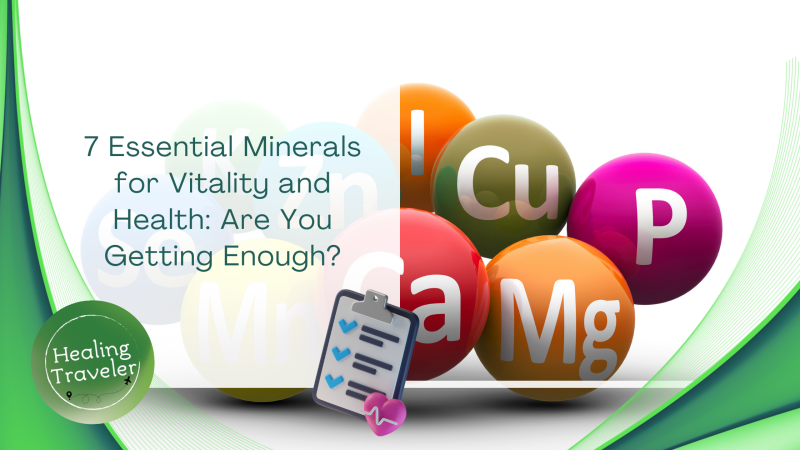
Minerals are indispensable for human health. Unlike macronutrients such as carbohydrates or proteins, minerals don’t provide energy directly, but they are critical for biochemical reactions, structural functions, and overall cellular health. Let’s explore the top seven essential minerals, what they do, and how they help us thrive.
1. Calcium: Building Blocks of Bones and Beyond
When most people think of calcium, they picture strong bones. This is accurate 99% of the calcium in the body resides in bones and teeth. However, calcium also plays an essential role in blood clotting, nerve signaling, and muscle contractions.
- Analysis: Calcium acts as a messenger in many intracellular processes. For example, when a nerve sends a signal to a muscle, calcium helps trigger that muscle contraction.
- Risk of Deficiency: Insufficient calcium intake can lead to brittle bones (osteoporosis) and, over time, affect heart rhythms.
- Sources: Alongside dairy, consider fortified plant-based milks, kale, tofu, and almonds. These alternatives are essential for those who are lactose intolerant or vegan.
2. Magnesium: The Multi-Tasking Mineral
Magnesium is a cofactor in more than 300 enzymatic reactions. From synthesizing DNA to relaxing muscles, magnesium is one of the most versatile minerals. Its stress-relieving properties have gained attention, especially in the wellness community.
- Analysis: Magnesium stabilizes the nervous system. Low levels have been linked to anxiety and insomnia. Furthermore, its role in glucose metabolism makes it critical for diabetes prevention and management.
- Sources: Spinach, nuts, and whole grains are excellent natural sources. Supplements such as magnesium glycinate are recommended for those with persistent deficiency.
3. Iron: Fuel for Oxygen Transport
Iron binds to hemoglobin, the molecule responsible for carrying oxygen in red blood cells. This transport system fuels every cell in the body, making iron indispensable for energy and endurance.
- Analysis: Iron deficiency is the leading nutritional deficiency worldwide. Women, especially those of childbearing age, are at heightened risk due to menstruation. Low levels not only lead to anemia but can also impair cognitive function.
- Sources: Include heme iron (from meat) and non-heme iron (from plants like lentils). Pairing non-heme iron sources with vitamin C boosts absorption.
4. Zinc: Key to Immunity and Healing
Zinc is crucial for cell growth and repair, immune function, and taste perception. A deficiency can manifest as recurrent infections, slow wound healing, or loss of taste and smell.
- Analysis: Zinc is also an antioxidant, protecting cells from free radical damage. This quality makes it a popular mineral in immune-boosting supplements. During illness, increasing zinc intake can shorten recovery times.
- Sources: Oysters are a rich source, but vegetarians can turn to pumpkin seeds and fortified cereals.
5. Potassium: The Fluid Balancer
Potassium is an electrolyte, which means it helps regulate fluid balance in the body. Beyond hydration, potassium is vital for cardiovascular health, as it counteracts the blood pressure-raising effects of sodium.
- Analysis: The average modern diet is overloaded with sodium, making potassium’s balancing effect more critical than ever. Consuming enough potassium reduces the risk of stroke and heart attack.
- Sources: Bananas are famous for their potassium content, but sweet potatoes, beans, and oranges are equally impressive sources.
6. Selenium: The Cellular Protector
Selenium is a trace mineral, yet it has a profound impact on health. It supports the thyroid gland, a key regulator of metabolism, and acts as a powerful antioxidant.
- Analysis: Selenium’s ability to fight oxidative stress has made it a subject of research in cancer prevention. Brazil nuts, which contain extraordinarily high levels of selenium, are a go-to source, but they should be consumed sparingly to avoid toxicity.
7. Iodine: Thyroid Health in Focus
Iodine’s primary role is in the production of thyroid hormones. Without sufficient iodine, you risk goiter or hypothyroidism, conditions that lead to fatigue, weight gain, and a sluggish metabolism.
- Analysis: While iodized salt has significantly reduced iodine deficiencies, natural sources like seaweed and seafood are better for those cutting back on processed foods.
Conclusion
These seven minerals form the foundation of good health, each playing unique and indispensable roles. By incorporating diverse food sources into your diet, you can avoid deficiencies and enjoy optimal vitality.




